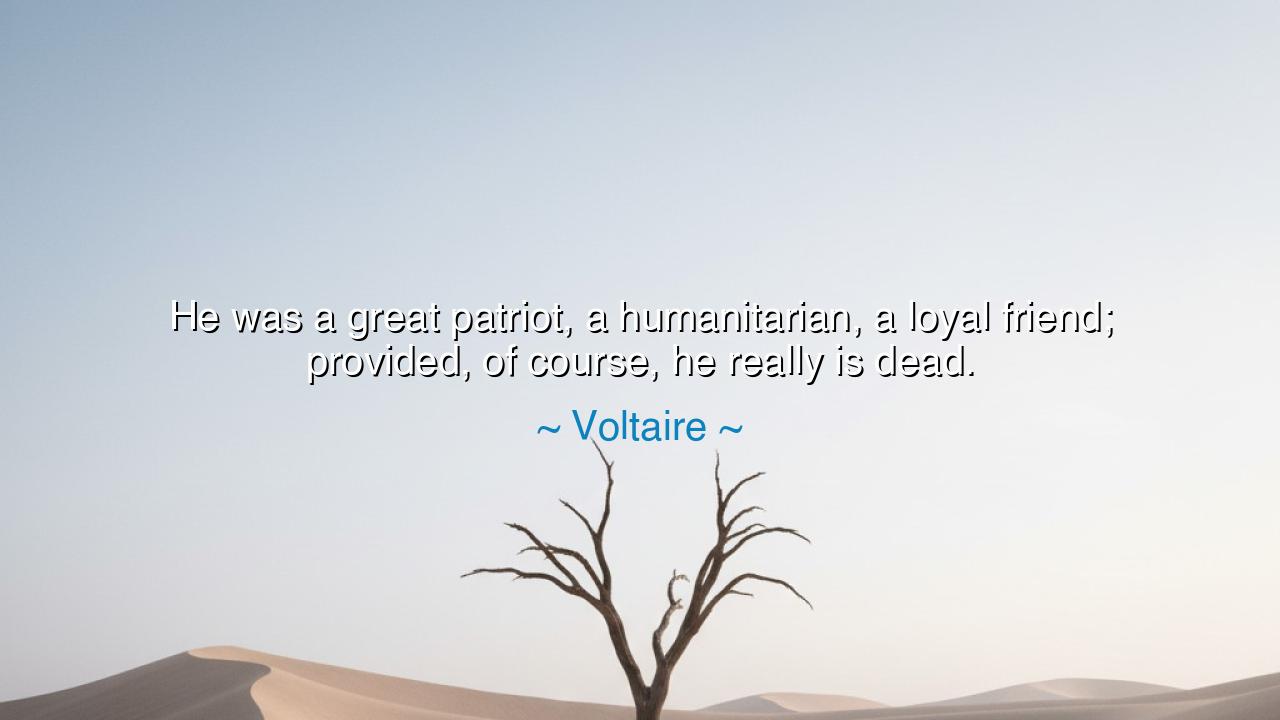
He was a great patriot, a humanitarian, a loyal friend; provided
He was a great patriot, a humanitarian, a loyal friend; provided, of course, he really is dead.






Hearken, O seekers of wisdom, to the sharp and incisive words of Voltaire, who quipped: “He was a great patriot, a humanitarian, a loyal friend; provided, of course, he really is dead.” In this paradoxical statement lies a meditation upon human perception, legacy, and the fickleness of reputation. Voltaire, master of wit and moral observation, reminds us that praise is often contingent, that the accolades bestowed upon men are sometimes measured not by deeds but by circumstance, and that the living are rarely free from scrutiny or envy.
From the earliest civilizations, the ancients understood that human admiration is tempered by envy and suspicion. In the courts of kings and emperors, generals and statesmen were often celebrated in death for deeds that were questioned in life. Voltaire’s epigram captures this eternal truth: the final judgment of character, rendered only after absence, is both ironic and revealing, exposing the ways in which society tempers recognition with skepticism. To be praised only after departure is to remind the living that reputation is fragile and contingent.
The words also illuminate the nature of human expectation and hypocrisy. Voltaire suggests that laudation is easiest when the object of praise can no longer respond, refute, or correct. In this, he reflects the ancient understanding that truth and recognition are often inseparable from timing and mortality. Praise can be selective, deferred, and manipulated, and the measure of a man’s deeds may be obscured by circumstance, envy, or personal bias.
Consider the life of Socrates, who was condemned and executed in Athens despite his profound contributions to philosophy and civic life. Only after his death did the admiration for his wisdom and moral courage grow to legend. Voltaire’s wry observation resonates: society often waits until absence to confer the accolades it withheld in life, revealing the delicate dance between human virtue and human judgment.
Yet there is also a lesson in discernment. Voltaire’s sharp wit warns us not to accept flattery blindly, nor to measure the worth of deeds solely by external praise. The living, entangled in envy, politics, or personal grievance, may fail to recognize merit. True appreciation, he intimates, comes not from casual acclaim but from measured reflection over time, often granted only in the final reckoning of history.
From this reflection emerges a universal teaching: strive to cultivate character, virtue, and loyalty not for the applause of contemporaries, but for the enduring value of deeds themselves. Recognition may be delayed, distorted, or absent entirely; yet integrity, courage, and service possess intrinsic worth, independent of transient opinion. History, like Voltaire, observes that timely or delayed acknowledgment does not define the value of a life well-lived.
Practical counsel flows naturally: pursue honor through action, not reputation. Engage in deeds of patriotism, humanity, and friendship with sincerity, understanding that true legacy is not the fleeting admiration of contemporaries, but the enduring impact on the world and those who follow. Let integrity and virtue guide conduct, rather than the hope of immediate praise or recognition.
Thus, O listener, let the words of Voltaire illuminate your path: human judgment is fickle, praise is conditional, and admiration often arrives only when one can no longer receive it. Seek to live with courage, loyalty, and compassion, for the measure of life is found not in the applause of the living, but in the lasting imprint of deeds upon the world and the hearts of those who endure beyond our fleeting presence.






AAdministratorAdministrator
Welcome, honored guests. Please leave a comment, we will respond soon